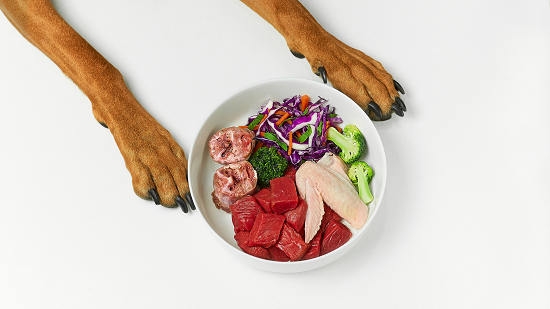You may wonder if all vegetables and fruits are safe for dogs or not. Well, the answer to this question is no, they are not. This list does not include oranges. Veterinary doctors say that dogs may have them, but only in small quantities.
The thing with oranges is that they are full of healthy vitamins and nutrients such as fiber and potassium. They are also low in sodium, and these all are precisely the reasons why they can be a healthy snack for dogs, but only if served in limited amounts. The maximum amount of orange your dog can have is two segments in a day.
The fruit is rich in Vitamin C. Thus, it can be so good for the immune system of your dog as well. So, to answer your question – can dogs eat oranges – yes, they can, but in moderation.
At times, your dog may ingest an orange, clementine, or tangerine accidentally, but as you know, there is no need for you to be worried in these cases. You would know that the fleshy part of an orange can be consumed by your dog.
Dogs are allowed to eat clementines and tangerines. They can have all kinds of oranges, and this includes mandarins as well. Usually, the commercially available dog food diets are balanced nutritionally, and thus your dog should not require any of their necessary nutrients to be supplemented further. However, if your fur child is begging for oranges because they love the sweet treat, you can let them have it, but only in small quantities.
What issues might dogs have with oranges?
Oranges are not poisonous, as such for dogs, but while feeding these fruits to your fur babies as a snack, you would do well to keep a few things in mind. First of all, they do contain sugar – in moderate amounts for humans, though – and this is why if your dog has too many segments of an orange, it can upset their gastrointestinal system.
If you wish to try giving your dog an orange, it would probably be a better idea to start slowly so that you can gauge how their stomachs are reacting to the fruit.
Before you feed them the orange, remove its peel and all the seeds. If you see that your dog is behaving unusually after having an orange stop feeding them the same. It may also happen that your dog loves oranges and does not show any adverse reaction to them.
Even in that case, you must restrict their consumption of oranges – along with all the other treats – to 10% of their daily calorie intake. When you limit their intake of treats you can stop them from gaining weight and make sure that their digestive systems are not upset.
Your dog might not also enjoy the tart taste of the fruit – in fact, they might be put off by the strong citric smell of any such fruit. In other cases, dogs might eat all you put in front of them, including the fruit and its peel.
By themselves, orange peels are not poisonous for your dog. However, they can get lodged in their digestive tracts. It can cause obstruction and might need no less than surgery to be rectified! Thus, you should keep oranges out of the reach of your dog.
Can dogs eat oranges? Yes, they can, but now that you also know the dangers of the same, you should be careful so that you are not sorry later on. In this context, you should also know that dogs of certain breeds can have oranges without compromising their safety.
However, in dogs with specific health conditions, this fruit needs to be avoided at all costs. For example, if your dog has been diagnosed with diabetes or if they are heavier than they should be oranges must be avoided at all costs.
The natural sugar that you get in oranges is not bad by itself, but in a diabetic dog, it can affect the blood sugar levels.
If you feed such a dog oranges in excessive quantities, they would gain calories that they would do well without. The natural sugar of oranges, coupled with their acidic nature, can upset your dogs’ stomachs.
So, as we have said already, offer them a bit of orange to start with to make sure that such adverse reactions can be prevented. If your dog’s GI, or gastrointestinal, system is sensitive, you must not feed them any oranges at all.
As we have iterated already, oranges are not poisonous for your dog, but if they have too many of them, it will upset their stomach. Because of the high citrus and sugar content of these fruits. So, be watchful of your dog to see if they are experiencing any of the following symptoms or not:
- diarrhea
- looking uncomfortable
- vomiting
- licking their lips
- loss of appetite or a decrease in the same
- Gulping owing to nausea
If your dog shows any of these signs after having eaten oranges, it is a clear sign that their stomachs are upset, and they need to be checked by a doctor.
Should puppies have oranges?
Yes, puppies can have oranges as well. However, do keep in mind that they are more vulnerable to having an upset GI than an adult dog.
This is why, you must start the process of feeding them oranges with an even smaller amount than you would with an adult dog. Also, as you would do with the latter, remove the seeds and the peel before you serve them the orange.
Should dogs eat orange peels?
When feeding your dog slices of orange, remove the peel and the seeds, as we have already said. Dogs find it difficult, if not impossible, to digest the peel, and it might lead to intestinal obstruction.
These peels also have oils that can also severely upset the stomach of your dog. This can lead to conditions such as vomiting and diarrhea. There is also a good chance that they could be dehydrated as well as a result of all these ailments.
Also Read: 20 Great Fruits And Veggies For Dogs To Eat And Not To Eat
Should dogs have orange juice?
Orange juice, by itself, is not toxic for dogs, but doctors recommend that you do not give it to your dog as a treat. The levels of acid and sugar are both high in orange juice, and that can be bad for your dog.
How many oranges should a dog eat?
How well the body of your dog digests oranges depends on factors such as the breed and size of your dog. For example, a German Shepherd or Husky might have two to three segments without any problem.
However, a smaller breed, such as a Pomeranian or a Yorkie would probably suffer an upset stomach if they ate a similar amount. Also, in the case of a smaller dog, such an amount of orange would make up a higher portion of their daily sugar and calorie intake compared to a larger dog.
As we have said already, all the treats you feed your dog must never exceed 10% of their calorie intake, and this includes fruits that are good for dogs, such as oranges. So, if you are feeding your dog oranges as a treat, make sure you are adjusting their meal portions by that.
Here, we provide you with some basic guidelines for feeding oranges safely to your dog based on their breed size and weight. However, it is still advisable that you talk to the doctor first before you introduce oranges to your dog’s diet.
- If you have an extra small dog, weighing between 2 and 20 pounds, ½ orange segment is the ideal amount. Examples of such breeds are Yorkies, Pomeranians, Chihuahuas, and Pugs.
- If you have a small dog, weighing between 21 and 30 pounds, the right amount would be the same as the extra-small breeds. Examples of such breeds are Basenjis, Miniature American Shepherds, and Beagles.
- If your dog is medium-sized, weighing between 31 and 50 pounds, you can feed them an entire segment. Examples of such breeds are Basset Hounds, Australian Cattle Dogs, and Border Collies.
- If your dog is large, weighing between 51 and 90 pounds, anywhere between one and two orange segments is okay. Examples of such breeds are Pit Bulls, Labrador Retrievers, German Shepherds, and Australian Shepherds.
- If you have an extra-large dog, with a weight of 91 pounds or more than that, you can easily feed them a couple of orange segments. Examples of such breeds are Newfoundland dogs, Saint Bernard dogs, Bernese Mountain Dogs, and Great Pyrenees dogs.
How can you feed oranges to your dog?
So, if you are ready to feed oranges to your dog, there are several ways in which you can go about it. Just ensure you have washed the oranges properly, peeled them, removed all the seeds, and divided them into small pieces before you feed them to your dog. So, the following are the different ways in which you can serve oranges to your dog:
- as snacks
- as food toppers
- frozen into their toys, especially KONG toys
- In fruit smoothies
- mixed into their yogurt
- Frozen in the form of fruit popsicles
- Made into ice cream
- dehydrated
We have already provided you with a portion guide depending on the size of your dog. You can adhere to that if you wish to give oranges as a tasty snack to your furball.
Do you want to make food toppers for your dog on your own? In that case, you can blend or chop the pieces and mix them into the food that your dog usually has.
You can also blend some pieces of orange, stuff them in the KONG toy your dog plays with, and freeze it so your dog can have a cold and refreshing treat they can enjoy later on.
You can also blend orange with other fruits safe for dogs, such as apples, blueberries, bananas, and strawberries, to create a fruit smoothie for them.
You can also mash up or blend pieces of orange and mix them with plain yogurt for your dog, free of any xylitol or sugar – please remember that xylitol is poisonous for dogs, and you do not want to feed it to your dog!
You can also put the mixture of yogurt and fruit for your dog into a popsicle tray or ice cube and freeze it overnight to create some doggy popsicles that your dog will surely love.
You can freeze orange chunks overnight and then blend them with plain yogurt to create ice cream safe for your dog.
You can also make dehydrated orange pieces for your dog if you have a dehydrating device at home.
The other types of citrus your dog can have
Following are other citric fruits and vegetables that can be fed safely to your dog:
- apples
- tomatoes
- bananas
- cherries
- blueberries
- watermelons
- strawberries
- honeydews
- raspberries
- cantaloupes
Conclusion
In the end, remember one thing, before you feed your dog anything new talk to the vet about it. This is especially so when you feed them human food rather than dog food.
This is because what may be useful for other dogs may not be the same for your dog. Whether a food will suit your dog, or not depends on factors, such as their age, health conditions, health history, and diet.
One thing is for sure – if your dog is on a prescription diet, you should not feed them any food or treat that is not part of such a diet. You already know the answer to the question – can dogs eat oranges– it is just that you need to be careful when you make such attempts the first time.
 DogExpress
DogExpress























 in Chandigarh, India.
in Chandigarh, India. 

